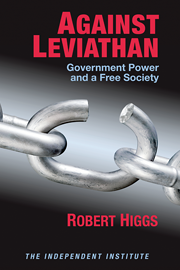In 1997, my article “Regime Uncertainty” appeared in The Independent Review. In the article, I sought to explain and elaborate on an idea that I believed, and continue to believe, helps substantially in understanding why the Great Depression dragged on for more than a decade. Because the basic idea may be helpfully invoked in understanding similar episodes, such as the slow recovery from the economic bust of 2007-2009, I have made numerous efforts in recent years to persuade my fellow economists and others that the incompleteness of the current recovery springs in significant degree from regime uncertainty’s role in discouraging additional private investments, especially long-term ones, and in discouraging new hiring, especially hiring for permanent, full-time positions.
In view of my sixteen-year campaign to bring about an understanding of the idea of “regime uncertainty,” one might think that I would be gratified by the growing recognition of the importance of the closely related (but narrower) idea of “policy uncertainty” in relation to the current, unusually slow recovery. However, most of the analysts and commentators who are now talking about policy uncertainty are doing so in ways that I find misleading and counter-productive.
In particular, many commentators (for example, Andy Sullivan, writing recently for Reuters) are interpreting the ill effects of the current policy uncertainty as having something to do especially with the congressional squabbling about sequesters, shutdowns, and other imagined horrors connected with Congress’s inability to write an annual budget and stick with it without ongoing emergency adjustments (e.g., increases in the statutory limit on public debt). These commentators suppose that such policy uncertainty harms the recovery because it impedes the public’s reliance on relentless increases in government spending, which they regard along Keynesian lines as a positive contribution to economic growth.
In contrast, my concept of regime uncertainty is something quite different. It is a form of uncertainty related to the public’s—especially the private investors’—confidence in the future security of private property rights, which can be impaired by future regulatory changes (e.g., Dodd-Frank and Obamacare regulations), court decisions, administrative twists and turns, tax increases in various forms (e.g., Obamacare penalties enforced through the income-tax system), monetary-policy changes that threaten the dollar’s purchasing power and distort the allocation of credit, and personnel changes in the government’s corps of executives, judges, and assorted capos.
Unlike most of the recent commentators, I do not perceive cutbacks or interruptions in government spending as matters of critical concern except to the members of special interests, including in particular government employees and contractors. For the overwhelming majority of the people, reduced government spending is a godsend, even if many people do not know that it is, because it helps to reduce the scale and scope of the government’s destructive involvement in economic life and because it reduces the crowding out of productive private activities, such as private provision of education and private assistance to the poor and others in economic distress.
Shifting resources from the government to private individuals and free-market firms is always a beneficial development, given that the government not only wastes many resources, but actually employs resources in destructive ways that harm the welfare of the general public.
Mainstream commentators seem to get their knickers in a twist especially when government employees are furloughed or some sort of government handout is temporarily suspended. In anything but the shortest-term perspective, however, these developments are positive, not negative. It is good to get people off the dole, and if budgetary mismanagement brings about this result, so much the better for the mismanagement.
Above all, people need to learn to assess such incidents without falling back into the misleading framework of Keynesian analysis. In particular, the inclusion of government purchases of newly produced goods and services in the calculation of GDP has worked much mischief over the years. The current wailing and gnashing of teeth over the government’s inability to produce its budgets responsibly and on schedule is only the latest occasion for such misinterpretation of the government’s role in the economy.
If only people could bring themselves to see the government for what, all in all, it is—a force for plunder, waste, and destruction—they might then have the wit to worry less about government spending cutbacks and to worry more about the manifold ways in which the government generates what I call regime uncertainty and thereby impedes real economic recovery and sustained long-term progress.




















